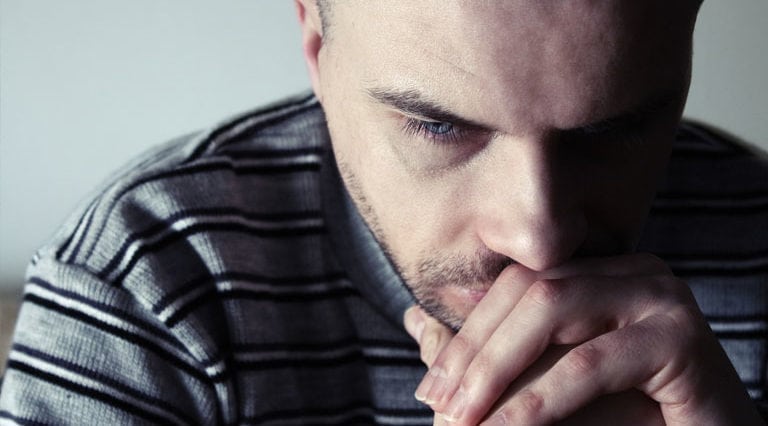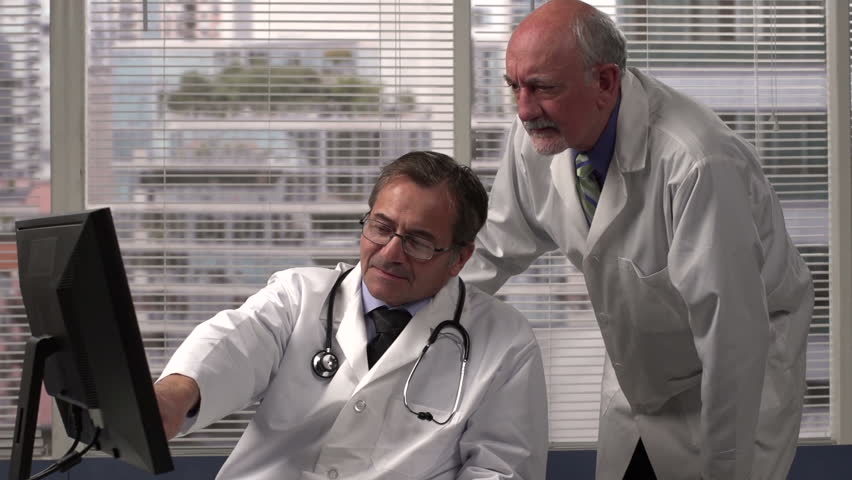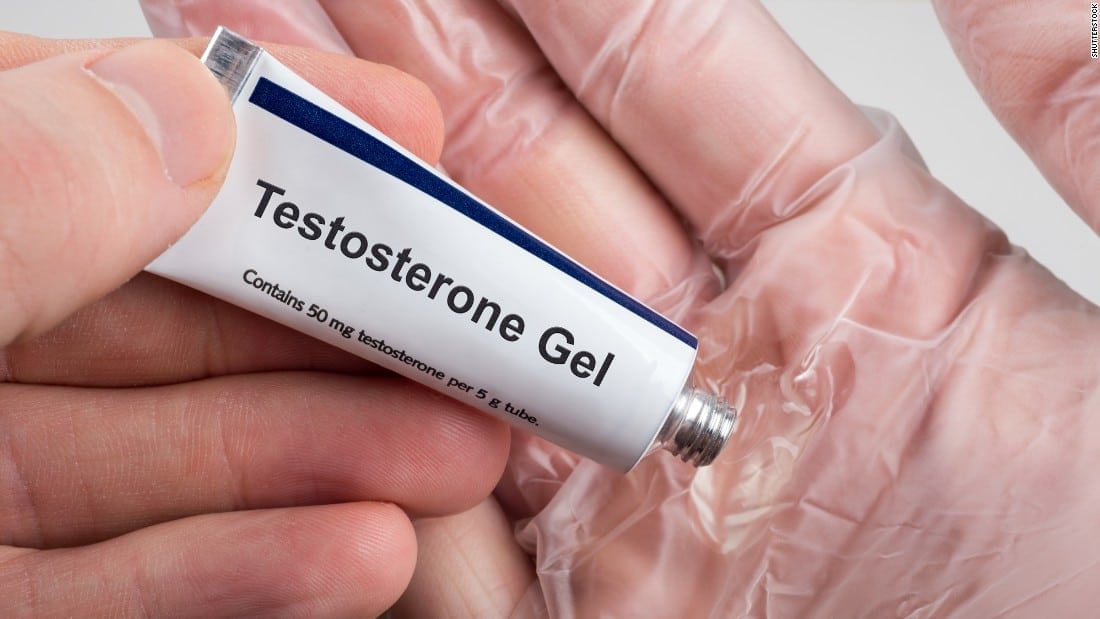In this article, I’m going to teach you about a disorder called Opioid-Induced Endocrinopathy which is significantly ruining the physical and mental health of millions of people on opioids. Have you noticed a decline in your libido since you’ve been taking opioids?
I know for myself when I was on opioids I rarely wanted to have sex with my girlfriend at the time. I came to find out years later after quitting opiates that these types of drugs lower testosterone.
But that isn’t even the tip of the iceberg.
It wasn’t until a few years ago that I learned about a disorder called Opioid-Induced Endocrinopathy, which has much more physical and psychological symptoms than just a decrease in libido.
I feel like it will be best if I lead into how I learned about Opioid-Induced Endocrinopathy before I cover the physiology, signs and symptoms, diagnosis, and treatment of the disorder.
But before I do, let me just say this…
If you’re on any type of opiate or opioid drug, you NEED to read this article all the way through.
I know this post is going to be a total eye-opener for countless individuals over the years, and you may be one of them.
Here we go…
Table of Contents
- 1 Clinical Observations While Working at a Methadone Clinic
- 2 Lesson Learned While Blogging
- 3 Opioid-Induced Endocrinopathy – Overview
- 4 Opioid-Induced Endocrinopathy Physiology
- 5 Symptoms of Opioid-Induced Endocrinopathy
- 6 Which Opioids Cause Opioid-Induced Endocrinopathy?
- 7 What is the Treatment Protocol for Opioid-Induced Endocrinopathy?
- 8 Step-By-Step Plan of Action if you Think you have Opioid-Induced Endocrinopathy
- 9 Opioid-Induced Endocrinopathy Success Stories
- 10 A Disturbing True Story
- 11 Opioid-Induced Endocrinopathy – Key Concepts
- 12 Opioid-Induced Endocrinopathy Conclusion
Clinical Observations While Working at a Methadone Clinic
Six years ago, I finished my internship at an Opiate Treatment Program (OTP). Since I did such a great job during my four-month internship, the Clinical Director (CD) told me there was a full-time counseling position open and she would love to hire me for it.
Of course, I was ecstatic!
I had been addicted to RX opiates and then progressed to smoking heroin, then got clean using 40 mg of methadone for seven days and some Valium for a few weeks after discontinuing methadone. Short-term methadone was a miracle for coming off heroin!
It was a dream come true to land my first counseling gig at a treatment facility that was a methadone clinic by day and moonlighted as an Outpatient Program (OP) where people came for all types of substance addictions, and most were prescribed Suboxone by our doctor.
I won’t go into too much detail about my experience working at this facility in this article, but I will write about my clinical observations and patient reporting about a certain “cluster of symptoms” that was very common in methadone patients.
Here were some common symptoms I either noticed and/or was informed about from patients:
- Decreased Libido
- Erectile Dysfunction
- Weight Gain
- Fatigue
- Sweating
- Hot Flashes
- Teeth Breaking
- Menstrual Irregularities
This is by no means a complete list of the symptoms patients reported after being on methadone for a while. However, these were the most commonly reported to me by methadone patients.
Lesson Learned While Blogging
To make a long story short, I left the counseling profession after a couple of years to start my own company helping opiate addicts, where I would have total freedom of creativity and I could do things my way.
I started a blog called OpiateAddictionSupport.com (which you’re on right now) and in the first few months of blogging, I wrote an article called How To Stop Methadone Weight Gain.
Since there were a lot of people asking this question, I wanted to help out.
My article talked about my clinical observations working at a methadone clinic and how a large percentage of patients reported weight gain, and how the patients that gained the most weight were on about 70-80 mg of methadone and up.

In my article on preventing methadone weight gain, I wrote about the importance of nutrition, hydration, taking certain supplements, and exercise, as I commonly heard from patients that methadone gave them a severe sweet tooth, and hardly anyone said they exercised on methadone.
A few months after I published my article, a reader wrote something in the comment section that totally opened my eyes and made me say “AHA!”
Here is what the guy (named Rowan) wrote:
“Hey Matt,
Great article, but I just wanted to share my own experience which might help others. I have been on methadone for most of the last 20 years and during the last six years my weight increased by 50% and I went from being lean to morbidly obese within three months. My teeth not only rot away but break off if I bite on anything hard.
I tried every imaginable dietary and nutritional weight loss technique including some experimental ones like peptides.
Nothing worked.
As a teen, I had pet rats and one time I had one of the males neutered by a vet. After the procedure the poor little guy ballooned and got so fat he could barely move. This memory reminded me of my own horrible situation so after years of no success I asked my doctor to check my hormone levels.
As I had suspected my testosterone levels were abnormally low, and I was referred to an endocrinologist – who is also a very famous researcher.
As soon as she found out I was on methadone she told me about Opioid-Induced Endocrinopathy – a condition caused by opioids with a long half-life like methadone which suppresses the performance of the endocrine system and results in the total disruption of sex hormone production.
I had a long series of tests and scans to identify any other possible causes.
Nothing.
What was happening is that the methadone was suppressing the function of the pituitary gland, which is responsible for signaling to the gonads how much testosterone (or estrogen in women) to produce.
The symptoms of low testosterone were exactly those that I had always associated with methadone: profuse sweating, weight gain, facial flushing, tooth decay and breakage, brittle bones.
These are all caused by methadone but indirectly.
In my case, I recently started testosterone replacement therapy and lost 16 kilos in the first month.
I can already see differences in my face and musculature and the fat is gradually being replaced by muscle tissue.
My weight gain ruined my life, shattered my self-confidence and self-esteem and aggravated my depression to the point where I tried to end my life.
Testosterone is giving me hope and finally, I can see a future that isn’t darkened by despair. For far too long methadone patients struggling to stay clean have had to suffer horrible side effects of pharmacotherapy and all this misery is totally unnecessary.” – Rowan
Opioid-Induced Endocrinopathy – Overview
Rowan really helped me out since he shed light on what was really causing methadone weight gain and many other symptoms. Since then, I have updated my article on methadone weight gain to include information on Opioid-Induced Endocrinopathy.
A bit later, I also wrote an article on How To Boost Libido While Taking Suboxone, Methadone, And Other Opiates. And in that article, I also added a section on Opioid-Induced Endocrinopathy.
Now years later, I’m finally writing a complete article specifically about Opioid-Induced Endocrinopathy. You’ve already learned a lot about Opioid-Induced Endocrinopathy from reading Rowan’s story above.
Thanks, Rowan!
But now I’m going to elaborate on more of the details of this disorder. So let’s begin!
Opioid-Induced Endocrinopathy Physiology
Opioid-Induced Endocrinopathy is one of the most common yet least often diagnosed negative consequences of prolonged opioid therapy. Sustained-action (aka long-acting) opioids used on a daily basis for more than 30 days have a number of negative effects on your endocrine function.
Here are some of the negative effects that the daily use of opioids can have.
Daily use of opioids can decrease levels of:
- Gonadal Sex Hormones
- Growth Hormone
- Cortisol
- Dehydroepiandrosterone Sulfate (DHEAS)
To properly teach you about the physiology of Opioid-Induced Endocrinopathy, I’m going to quote a rather large passage from the best article I’ve found on it, called Opioid-Induced Endocrinopathy and published in The Journal of the American Osteopathic Association.
I highly recommend reading that article in its entirety, as it is totally comprehensive and written by two doctors that have done a lot of research and really know this subject well.
Here is a directly quoted passage from that article that explains this disorder:
“The primary mechanism for opiate-induced sex hormone deficiency is suppression of the hypothalamic-pituitary-gonadal axis. Sex hormones are produced by the gonads—testes in men, ovaries in women. The principal sex hormones are testosterone in men and estradiol in women.
The luteinizing hormone (LH) and follicle-stimulating hormone (FSH) are referred to as gonadotropins because they stimulate production of gonadal hormones.
The hypothalamic-pituitary-gonadal process of controlling the production and secretion of sex hormones begins with secretion of gonadotropin-releasing hormone (GnRH) by the hypothalamus (Figure 2). This hormone stimulates the pituitary gland to secrete LH and FSH.
Once released into systemic circulation, these two hormones interact with the testes or ovaries to secrete testosterone or estrogen, respectively.
As sex hormone levels rise, they signal the hypothalamus to decrease production of GnRH, thus forming a feedback control loop.
Levels of testosterone and estradiol are just two of the influences on GnRH production and release.
Many neurotransmitters may influence the GnRH secretory pattern, and endogenous and exogenous opioids exert an inhibitory effect on GnRH.
Opioids decrease LH while opiate antagonists (eg, naloxone hydrochloride) increase these hormone levels. Although opioids’ affect on LH and subsequent sex hormone release is not completely understood, opioids may alter the sex hormone–hypothalamic feedback process.
Adverse effects of sustained-action opioids. Sex hormone deficiency is identified by hypogonadotropic hypogonadism (ie, decreased levels of gonadotropin-releasing hormone, luteinizing hormone, testosterone, or estradiol) or decreased adrenal androgen production (ie, decreased levels of dehydroepiandrosterone and dehydroepiandrosterone sulfate).”
Symptoms of Opioid-Induced Endocrinopathy
Can you see why I quoted so much information from that awesome article?! I’m not a doctor, and it would’ve taken me quite some time to learn all that info and then put the concepts into my own words.
Now that you’ve been educated on the physiology of Opioid-Induced Endocrinopathy, let’s go over the common symptoms that result from this disorder.
Common symptoms of Opioid-Induced Endocrinopathy include:
- Anemia
- Decreased Libido
- Decreased Muscle Mass
- Depression
- Erectile Dysfunction
- Fatigue
- Hot Flashes
- Menstrual Irregularities
- Osteoporosis
- Sweating
- Vasomotor Instability
- Weight Gain
Which Opioids Cause Opioid-Induced Endocrinopathy?
Any opiate or opioid drug can cause Opioid-Induced Endocrinopathy. However, the sustained-action opioids (especially methadone) are much more likely to cause significant endocrinopathy than short-acting opioids.
According to the article, I quoted previously, “Opioid-induced endocrinopathy should be considered in any patient receiving daily opioid treatment in an amount equivalent to 100 mg of morphine or more.
In addition, patients should be asked routinely about symptoms suggestive of sex hormone deficiency before treatment and at regularly scheduled follow-up medical visits.”
What is the Treatment Protocol for Opioid-Induced Endocrinopathy?
If you’ve been identifying with some of the symptoms associated with Opioid-Induced Endocrinopathy, you may have a mild, moderate, or severe case of this disorder. Luckily, there is hope. Researchers have found ways to reverse Opioid-Induced Endocrinopathy.
Here are some recommended treatment protocols for Opioid-Induced Endocrinopathy:
- Supplementation – Testosterone for men, and 50 to 100 mg of DHEA for women (or testosterone for women but only 1/4 the amount needed for males).
- Opioid Rotation – Patients who gained weight when receiving long-term treatment with morphine or methadone subsequently lost substantial weight when rotated to oxycodone or buprenorphine.

Step-By-Step Plan of Action if you Think you have Opioid-Induced Endocrinopathy
If you are experiencing any of the symptoms of Opioid-Induced Endocrinopathy, or if you’re on over 100 mg of morphine or the equivalent, and especially if you’re on methadone, I recommend going to your doctor for a checkup.
Since most doctors are clueless about Opioid-Induced Endocrinopathy, I also highly recommend printing out the article I referred to in my post in a PDF format to show your doctor.
There are several ways you can create a PDF file from a web page. Google it if you don’t know how. If it’s above your technical ability and you also don’t know anyone that can help you do this, you can just show your doctor the article on your smartphone.
Opioid-Induced Endocrinopathy Success Stories
I’ve already posted Rowan’s success story he wrote about using testosterone therapy to reverse his severe case of Opioid-Induced Endocrinopathy. And now I’m going to travel back in time to when I was a methadone counselor yet again.
Toward the end of my time working at the methadone clinic, one of the counselors quit. The Clinical Supervisor (CS) divided up the counselor’s caseload between me and the other counselors and I received several new patients.
One of those patients was a 45-year-old male that told me the following:
- He had been on 140 mg of methadone for six years.
- He suffered from massive weight gain, low libido, erectile dysfunction (ED), fatigue, depression, loss of muscle mass, and many other symptoms associated with Opioid-Induced Endocrinopathy.
- After years of enduring these awful symptoms, he told his doctor and as a result was prescribed testosterone.
- He stated that the testosterone injections took away nearly all of his symptoms and as a result, he was much happier and healthier while taking 140 mg of daily methadone.
A Disturbing True Story
At the time I was counseling the patient that told me of his success using testosterone therapy to reduce his symptoms from methadone, I was still ignorant about Opioid-Induced Endocrinopathy. However, after I learned about this disorder, I called the methadone clinic where I used to work to share this important information.
I figured that the Clinical Director, nurses, and doctors that worked there would be overjoyed about this, as, from my estimation, at least 70% of all the patients there (over 350 patients) suffered from Opioid-Induced Endocrinopathy to at least some degree, and it was apparent that many had severe cases.
So I told the Clinical Director who runs the facility, and she got excited and told me she planned on telling the doctors to start educating new patients about this disorder and to begin testing current patients for Opioid-Induced Endocrinopathy.
Unfortunately, she never told a soul.
Why?
The methadone clinic was for profit and operated under a “Business Model” of treatment. Thus, the people “running the show” were always trying to increase admissions and retention.
Patients were commonly complaining of all these symptoms associated with Opioid-Induced Endocrinopathy, but due to ignorance on the part of counselors, supervisors, and even nurses and doctors, patients were often told weight gain was due to getting clean and possibly poor eating habits as well.
While there was validation that methadone was obviously responsible for some side effects, there was never a legit diagnosis of Opioid-Induced Endocrinopathy, nor a treatment protocol to help these methadone patients reduce or eliminate these symptoms.
What do you think would happen to the admission and retention rates of the methadone clinic if now the patients had a real answer to just how much methadone can screw up your endocrine system and thus physical and psychological health?
I’ll tell exactly what would happen…
Admission and retention rates would go down significantly, and thus so would profits.
Over time, more and more people would learn about Opioid-Induced Endocrinopathy, and this particular company I used to work for had clinics all over the nation.
Perhaps in a few years time the fact that methadone caused Opioid-Induced Endocrinopathy would become mainstream and thus all clinics would see a drop in profits, leading to much fewer profits than if it only affected the one clinic that I used to work at.
You know what?
I attended weekly employee meetings for two years while working as a counselor at a methadone clinic. Sadly, there was not a single meeting where an item on the meeting agenda was “how to help people get off methadone.”
Instead, the meeting agendas constantly were on “how to increase admits, how to increase retention, and how to make sure patients on MediCal came to their counseling sessions.”
The company I worked for billed MediCal a lot of money per counseling session the patient had and that was the primary way the company made money.
Cash patients would only have to see a counselor 1x per month, but patients with MediCal would have to start off with 60-minute counseling sessions 4x a month because the methadone facility would then be able to make way more money.
That is just one of the many reasons I decided to give my two-weeks notice and start my own company for helping people recover from opiate addiction.
I just went off on an unplanned tangent on this subject, but hey, you should be aware of these types of things. I am a big advocate of Harm Reduction and Medication-Assisted Treatment, and I think methadone and other sustained-action opioids are very helpful to a lot of patients.
But it would also be nice if the doctors and treatment programs prescribing opioids were aware of Opioid-Induced Endocrinopathy and how to diagnose and treat it. That would literally help increase the quality of lives of millions of patients taking these drugs for pain relief and/or opioid addiction.
Opioid-Induced Endocrinopathy – Key Concepts
Millions of patients continue to require opioid analgesics for control of moderate to severe chronic pain, which is a disease that affects more Americans than cancer, heart disease, and diabetes combined. Additionally, there are millions of people without pain syndromes that are addicted to opioids or are taking Opiate Replacement Medications such as methadone for opiate addiction.
While most doctors and patients are aware of the common opioid effects such as sedation, constipation, pain relief, and nausea, hardly anyone has ever even heard of Opioid-Induced Endocrinopathy, despite the fact that millions of people are suffering from this disorder to at least some degree.
Here are the key concepts regarding Opioid-Induced Endocrinopathy which I synthesized from the article I previously quoted:
- Opioid-Induced Endocrinopathy is one of the most common yet least often diagnosed consequences of prolonged opioid therapy.
- Any opiate or opioid drug can adversely affect endocrine function and reduce testosterone and cause low libido and other side effects.
- Long-acting (aka sustained-action) opioids used for a month or longer can lead to Opioid-Induced Endocrinopathy.
- The severity of symptoms depends on a number of factors, some of the main ones being the type of opioid (methadone causes symptoms the most) used, the dosage, and the length of time taking opioids.
- Doctors prescribing opioids (and nurses too) should be educated on Opioid-Induced Endocrinopathy.
- Doctors should tell their patients about the possibility of them getting this disorder if the patient is receiving daily opioid treatment in an amount equivalent to 100 mg of morphine or more.
- Patients should report any symptoms associated with Opioid-Induced Endocrinopathy to their doctor as soon as possible.
- Current treatment approaches for Opioid-Induced Endocrinopathy are an opioid rotation, testosterone therapy, or 50-100 mg of daily DHEA supplementation for females.
- Testosterone supplementation should be administered in amounts needed to manage symptoms of hypogonadism (amounts higher than needed may increase the risk of prostatic hypertrophy and prostate cancer).
- In the United States, DHEA is available as a dietary supplement and is marketed with claims that daily treatment will decrease postmenopausal bone loss and improve muscle strength, sexual performance, and memory.
- Female patients with suspected androgen deficiency who are receiving long-term opioid treatment have reported increased energy, increased libido, and weight loss with DHEA supplementation.
Here’s a simple breakdown for doctors which I’m quoting from the same article I’ve been referencing:
- After opioid treatment is initiated, patients should be routinely evaluated for signs and symptoms of endocrinopathy.
- Testosterone supplementation is the primary treatment option for men, while DHEA supplementation may be preferred in women.
- Because some opioids may result in less endocrine dysfunction than others, rotation to a different opioid may also be an appropriate treatment option, particularly for women.
Opioid-Induced Endocrinopathy Conclusion
Low libido and sexual dysfunction can cause significant problems in intimate relationships. Fatigue and depression can lead to extreme difficulty working, running a business, parenting, and enjoying life.
Undiagnosed and untreated Opioid-Induced Endocrinopathy due to unintentional (yet harmful) ignorance is causing so much needless suffering. Please help me spread awareness by sharing this article with anyone that you think would benefit from it.
Thank you.
If you have any comments or questions about Opioid-Induced Endocrinopathy physiology, signs and symptoms, diagnosis, and treatment, please post them in the comment box below.



















Hey just so everyone is aware. First off I am a male. I have a condition called varicocele. That unfortunately is a issue on its own that reduces a males testosterone levels. I eventually after being on methadone for years I think I was between 3-5 at that point top dosage was 265mgs. Granted I was a huge IV heroin addict and am lucky I never fully died or went to prison. I tried suboxone at first and the max dosage that a person is able to take before it simply becomes ineffective to take anymore. I think it was 24 or 32 mg. I cannot remember however I was in just as bad shape as trying to go cold turkey. I honestly thought that it was over for me at that time and it was a very dark part of my life where a miracle that caused my attempted suicide to fail. I don’t know how or why it happened but I was stripped from taking the easy way out by either a higher power or if you don’t believe in that luck. When I found out after I went to the middle of no where same situation but this time a shot clearly fired I was willing to open up to a family member for help even though I knew that it would crush their spirit. I went to a place with her explained how suboxone was ineffective for me and was told about a methadone clinic but was told “they’ll have you on so much you’ll become a zombie”. Unfortunately I knew that I was probably going to need to be at an insanely high dosage but I think now I should have heeded those words more than I did. They started me at forty and as I climbed in dosage I still was using heroin to get myself through the lack of a higher dose to get past a whole day of not going into insane withdrawals. Well I have to say I don’t recommend anyone ever make that mistake as methadone blocks your receptors not like suboxone but it requires that more heroin is needed to get that rush. Eventually I fell asleep driving. Rolled my SUV into a corn field with my arm out the window was told I was lucky it wasn’t ripped off. That was a hard lesson to get me to stop the bs but then I guarantee that I ended up having to go higher than I needed to because of those actions. So years later life’s improving and I’m very happy but I noticed I had swelling below my nipples and a lump in one. I had my testosterone tested along with the worst mammogram I have ever seen and was told by the doctor who did it that he had more important patients to help when you could see a clear deformation in one side. Well my testosterone level was 17 yeah 17 lower than what a post menopausal woman would have. My doctor at the clinic time n time again denied any correlation between methadone and low Testosterone. So because of the horrible doctor who did my mammogram I had elective surgery done. During which they found a lump of precancerous tissue attached to one of my nipples. I had to get half of it removed to get rid of the lump but I remember after my first blood test I was forced to have another as the doctor said he never had seen anyone with such a low value of testosterone. I’m now at 12mgs and almost off. The struggle now is having no energy and zero drive combined with this feeling of nothing bringing me enjoyment or excitement and just feeling so bored. However my testosterone is low but not bad it’s just below the average level of a male my age. So be careful with your dosage other medical or medications that would exacerbate the problem and not doing anything to make the last of the detox easier. If anyone wants to change things and make it easier that’s the best advice I can give. Don’t listen to the clinic doctors. Mine told me it doesn’t affect your teeth and all sorts of lies. Opiate replacement therapy is just a small part of turning your life around. I’m not big on groups but definitely suggest finding a good therapist if you have any PTSD like myself. Be sure you stay active and work out not so much lifting weights but also building up your stamina and keeping the lean muscle that can get lost from low testosterone. I am living proof that the worst addicts can change that the current forms of treatment aren’t perfect but are the best we have just require self care not just taking your meds and then thinking things are ok. Some lessons have to be learned from experience and that’s ok as long as you don’t give up. Groups are important in the beginning but stay away from making friends in them as gossip is a huge problem in every single one I’ve gone to. If you take care of your mental n physical health you can make it far easier and it’s not just me. I saw a person who had been at the clinic just about as long as me who was now at 9mg. Methadone is liquid handcuffs and I only recommend it for IV heroin addicts but it’s a long tough road that’s far better than death or prison. Good luck to anyone who is trying to change. Believe in what you are capable of and don’t get discouraged too easily. I hope the best for all of those who are still lost in the depths of addiction. Stay strong!
How would this effect profit in clinics when people still need their methadone? This will just make them more pleasant feeling while in treatment. Unless clinics get paid by the milligram and even then you know people still enjoy that high when on a h8fh dose. Methadone always baffled me. Synthetic legal high seens counter active but who am i besides an addict. Matter of fact when i wanted a high id cop methadone. Never precipitated withdrawals either and i was on 24mg suboxone. I just have a weird body i guess though it did take a lot to break the barrier in my receptors and the funny thing is i did this to get my libido back for a day. On suboxone i have 0 libido and by chance i am in the mood an orgasm is almost impossible. Its part of what ruined me and my marriage because my not being in the mood just got him to look elsewhere. After months of not getting any i dont blame him.
Jumped off suboxone and was a horny toad. Worked past that infidelity and sex was grand until i realized i never forgave him so now we are almost divorced and im back on suboxone because the separation resulted in relapse after yrs of staying away from H.
Now im fat as a cow x5 and hate that im back on suboxone. And forget a libido. Also forget periods. Im gonna try DHEA. Fingers crossed. If it works i. Excited to tell my counselor. I’m also about to get a weight loss prescription and maybe weight loss surgery so if i can avoid that it would be great!
Methadone doesnt give you ANY HIGH at all after the first day or 2. And even on those 2 days, it is NOTHING at all like taking it occasionally on the street in pill form. If you have a SERIOUS addiction with HIGH tolerance, even 80-100mgs of methadone at a clinic will not give you a high. What it does is eliminate withdrawal and cravings, allow you to function, get a job, and get your life back. Thats what it does. Source: MMT patient for 5 years.
Matt–do you think Kratom can cause OIE? I’ve been on the Opiate/Suboxone/Kratom trail for about 3 years now. Most recently on Kratom for the past year. I have just about all the symptoms you listed Especially NO LIBIDO and about 30lb. Weight Gain– I’m a middle aged female and have absolutely NO sexual desire. I have an appointment with Endocrinologist soon and want to make sure he is aware of this.
Thanks in advance! You’re the Best !!
Absolutely. It can and does cause this. Kratom can totally screw up your endocrine system, thyroid, and more. Typically this happens when the dosage is moderate to high and daily use. All opioids can cause endocrine dysfunction (including Kratom) and thus the sex hormone production becomes super depleted in many people, leading to a host of unpleasant symptoms (like the ones you mentioned you have). Hope this helps. Best of luck to you!
Thank God I found this. I love all your articles but this is what I’ve been searching for! I was on Suboxone for 2 years and asked my doctor if it affected Libido. He actually laughed and said No! I knew he was wrong.. it had to be as I have no desire and literally have not had sex in over 2 years. I am making an appointment with Endocrinologist tomorrow. I will update on the outcome.
I’m so glad you found this article too. More people need to know about this. And soon your endocrinologist will get you on the right protocol! I recently started on testosterone replacement therapy just before I turned 40 after getting my levels checked and seeing how low they were, and it has totally improved my life.
I also take a transdermal human growth hormone homeopathic supplement that works great too, which females on opioids love since they cannot take testosterone usually.
Hi Matt!
Would you mind sharing the name of the transdermal human growth hormone homeopathic supplement?
Thank you!
Hi Matt , I totally know you’re a busy guy, but…as SO many of us are suffering from this opiate induced endocrinopathy , it could help countless people to have this info via a video . Please, please consider making a vid about this. Especially for those of us in PAWS and wondering wth is going on? Why after months the sweats continue, muscle mass is still not coming back, etc. ?
Sincerely , me
I can put this topic on the video list. Thanks for the recommendation.
Here is a big question I have. where is the aromatase activity coming from? I do have very low Test but I ALSO have VERY high estrogen. So obviously my test is being converted as a man its not normal to be at 150 estrogen count. So even if i do take Test i will not see any improvement cause it will be converted to estrogen…. What can i do?!?
See a doctor that specializes in hormone replacement. They’ll prescribe anastrozole. Doctors normally prescribe too much and it will have adverse effects too. So you should get your blood checked every month for three-six months to stabilize. I take 100mg of testosterone cypionate 2x a week and take only .25mg of anastrozole 1-2x a week to keep my estrogen in check…. good luck
I found about the endocrine system being affected by opiates/opoids a few months ago but this article helped me to pull all of the info together. I’m 59 years old and the doctor prescribed oxycontin when i was 43. By age 45, i had been through menopause. Although I was thrilled at the time, i knew it wasn’t normal. I got off of a total of 900 mgs. of timed release morphine and 120 mgs. of oxycodone 2 yrs ago with suboxone. I’m down to 1 mg/day and want to come off completely. I’ve lost almost every tooth – most crunched off, as you said. I’m in the midst of getting that mess fixed! The rotting roots that are left negatively affect everyone’s health and to a greater extent than most realize.
I’m going to start the DHEA just as soon as it’s delivered and I’m going to research what herbs are beneficial for the endocrine system, as well.
I’m going to mark this post and come back in a couple of months and report on any differences in my health. Thanks, Matt!!😊
After months and months of research, trying new supplements, prescriptions, I just ordered the DHEA supplement. I have been on 120mg for 4 years. I started the clinic at 120, my baseline weight should be 130. I have gained 30 pounds. I fluctuate between 160 and 164. I work out, strenuously at least 3 times a week (where my heart rate is in the 170’s), I eat many veggies, lean meats. Never, ever fast food. I have learned to control my sugar cravings, where I used to eat entire bags of gummie bears, pints of ice cream in one sitting, XXL Symphony Toffee Bars, I eat NONE of that now. I simply got sick of my counselors at the Methadone Clinic blaming my weight gain on sweets. And I wanted to do everything in my power to lose this weight.
I take 3 Vitadone tablets a day. I drink over 64 oz of water. I eat 2-3 servings of leafy greans/non starchy veggies a day. I limit my bread, and other starches. I even got prescribed Cytomel (for an underactive thyroid) by my PCP because he thought it would help me lose weight. It did not. Nothing has worked. I drink detox teas every night to deal with the constipation. That helps me poop about 30% more than I used to, but I still feel constipated ALL THE TIME.
I think about how fat and nasty I look every single day. My boyfriend of 5 years never did drugs and he just does not understand why I can’t lose weight. It is destroying our relationship. It has already destroyed my self esteem. I hate what I see in the mirror, mainly in my belly.
I have already decided that it is time for me to detox, and I start the first week of October. But in the meantime, I will continue to try everything to get this unhealthy weight off. Even though I take Vitadone daily, I still sweat way too much, to where it is embarrassing. Yet another thing that my boyfriend does not understand. It hurts so much when I won’t let him hug me, or touch my back because I am embarrassed for him to feel the sweat running down my back.
I am so glad I found this website, and these tips. Despite the fact that I feel there is a little hope for me to feel and look normal again on Methadone, I can’t wait to begin my detox! I have been clean from opiates for over a year and am ready to start a new chapter. I just graduated with my social work degree, and want to have children – (but not while I am on methadone!) I can’t wait for my boyfriend and family to see this weight come off of me! I know that they all think, “well, you should just exercise more” or “you must be eating a terrible diet”. My boyfriend tells me “You have been going to the gym for 3 years now, and I see no results. You must not be trying hard enough!”. And that is what hurts the most. For me to be doing every possible thing that I know to do and still not losing any weight. It is so depressing, I am about to start crying just writing this!
I will come back and write a review after I finish the bottle of DHEA. I will stay on my Vitadone, detox tea, exercise, veggies, water regime. (oh, not to mention Fiber 1 bars. I just bought some Benefiber today…. I just want to have normal bowels! I know I need to poop more! Enimas (good old fashioned water bags) don’t work either. A little comes out, but it’s mostly just the water.)
Thanks, Matt, for your work to help people like me. Reading your blog posts has affirmed for me that I am not destined to be fat forever!
Reading your comment is why I still write these articles even though I already have 300 on this website. I absolutely love to know it’s making a difference. As I read your post I became so excited for you because all these years of working on your weight and sweating plus other symptoms, and now you know the truth that nobody at your clinic knew. And now you have multiple options to try and you can see a light at the end of the tunnel.
I’m cheering for you and I do hope to hear from you again with an update, as I would love to follow your journey. 🙂
Matt, you are SO FREAKIN AWESOME!!! I am no doctor myself but I am 100% POSITIVE this is what I have (O.I.E.)! I have every symptom listed! I’ve been in MAT for about 5 years dosing at 110mgs until just recently dropped down to 60mgs. After 3 months I gained over 70 lbs!! And of course my clinic sold me the lines as mentioned above. Now come on, I wasn’t even THIS FAT PREGNANT??!! 3 months after having my son I was all but 7 lbs shy of my pre-pregnancy weight of 132 lbs and remained at 139 lbs until I began MAT. After about 2 years into treatment not only was I pushing 200 lbs then my TEETH BEGAN BREAKING OFF??!! I absolutely KNEW it had to be somehow related to the methadone! My clinic told me it was a “myth” and then had the nerve to say, “most addicts before deciding on some sort of treatment oral hygiene usually isn’t ranked very high on their list”! Um ok, I can only speak for myself here…. No matter how many pills or how much heroine I consumed, and even on the days I WAS SICK AS A DOG before getting into MAT… I NEVER LET GO OF MY DAILY/ORAL HYGIENE!!!
To FINALLY have some RIGHT answers as to WHY I’m experiencing all these symptoms is beyond words! Thank you, thank you, thank you☺!!! Not sure if you Matt, or anyone else out there would possibly know of any free or low cost dental programs for individuals with O.I.E.? I would love to afford permanent dentures or the “All on 4” that screw into your gums! It crushes me to think I may have to resort to the old fashion kind you take out each night… I am way too young for that!😦
Rebecca
New York, USA
After I got down low enough like .23, i felt more normal. I went on gabapentin to get through it and am now 3 months without subs. My libido is better but I wonder if it takes time to get back to normal.
I want to let people know that Maca Root and DHEA are the best supplements for OIE. I told my PM doctor that I felt very strongly I had OIE since gaining 60 pounds in a few months and chronic fatigue, sweating through my clothes and bedding, severe depression and brain fog. His response was that if he was to agree with me I would be dismissed from pain management that day with no refills and he suggested I go to Weight Watchers! I felt hopeless being in constant pain and feeling like I needed opiates to get out of bed. It’s easily the worst year of my life being on 80 mg of methadone and 90mg of oxy without a clue how to endure the dread and panic I felt when the pills wore off at night. With extreme measures I was able to free myself from methadone and oxycodone but I find spreading awareness of these health risks and educating the public of the fact they are lied to, will I hope someday expose these professionals who we are supposed to be able to trust to have our best interest to not take advantage. Best of luck!!
Great post!!! Sheleen I thank you for writing about your experience. Keep up with the great work spreading awareness about this disorder. 🙂
So everything in this post is EXACTLY what I’ve been experiencing for YEARS and I never heard of this condition just told well suboxone can cause those effects I have been on 16 mg of suboxone for 5 years I don’t want to get off suboxone I’m actually on the 300mg sublocade shot with 1 8mg stip of suboxone a day but I’d like these other symptoms to stop i havnt had sex in 8 months and I’m completely ok with it which isn’t normal for me accounting the fact before I got on suboxone it was happening sometimes twice a day I’ve also gained ALOT of weight since being on suboxone about 50 lbs I consitanitly crave sweets and junk food and I try to not feed into the cravings but then I just get depressed and eat it anyway this also isn’t me I used to be the healthiest person all veggies and low fat meats almond milk you name it I’ve also notice my bones are weak and I hurt all over in my bones when I get up in the mornings so I have a very strong feeling after reading this I’ve had this for years and had no idea 🙁 but after reading these comments I’m afraid to talk to my doc by no means do I want to stop suboxone its changed my life for the better but I would like to find out if this is what I have so I can maybe get medication to help! Thanks for another great article Matt once again you rock ❤❤
Thank you for this article. I will be bringing this to my counselors attention. I got on methadone because I was addicted to Vicodin, Percocet, etc. I did try Heroin when I was younger but only did it for a month and quit. I started treatment May of 2015. My weight was 117 and I’m 5’7. I had always been tiny my whole life. At my highest dose I was at 140 mg per day. Which pretty much kept me in a comatose state, I’d even talk to myself and make weird noises in my sleep, would have a Russian roulette drive home trying to stay awake driving. I craved sweets, so bad. It was like I needed them. So I went from 117 to 195 pounds. Which is devastating. I don’t wear make up. I hate looking in the mirror. It’s effected me in all aspects of my life. Than as another cruel joke. My teeth starting literally crumbling the last 2 years, I lost my left K9 tooth and all the rest on the upper left side back except for 1 molar. I went a year like that and finally got a partial. For 2 months I was going to the gym and running 6 miles a day. I never lost one pound. For 1 1/2 I’ve been stuck at 172. I have tapered and am at only 14 mge per day going down 1 mg a week. And no weight has come off. I’m at my wit’s end.
Hi Ronnie,
I’m glad this article shed light on what is happening to your body from the methadone, and now you have science to show your counselor and the doctor to help you get treatment for this condition. Testosterone therapy should quickly help to resolve this issue so you can feel better fast.
I am almost in tears as well after reading this! It’s like you were describing me to a T! I’ve gained 50 pounds after being on MMT for a couple years now and at 105mgs… They just tell me to cut back on sugar and exercise more but I keep telling them it’s physically impossible for me to be gaining weight just from overeating because about a year and a half from started Methadone I had to have my entire stomach removed due to chronic severe ulcers! So I literally cannot overeat and should not by any means gain weight much less 50 friggin pounds!! I’m so self conscious and depressed now as well. Every symptom you described was like you were describing me. So the DHEA should correct it??? Is there anything I could take or do that would help?? I HAVE to get this weight off!!! 😢
Hi Matt. I have A question. I have Been taking opiates for a while and I’m noticing spider veins on my legs and other endocrine issues. Your article is great and very informative.
My question is will the spider veins and other issues improve and will my endocrine system improve on its own if i stop Taking opiates altogether. ? I plan to stop with suboxone and i feel Like i messed Myself up pretty bad. I’m only 38 year old male and i have these red and blue little lines all over my legs and I’m sure it’s from the opiates.
Resending bc i dont Know if I.T sent bc my phone shut off
I’m almost in tears right now…I experienced early ( way too early ) menopause and now I know why.
My ( once strong and muscular ) body is now soft like an old lady.
Ladies, please, if you are on suboxone or methadone, please stop before this happens to you.
It’s not good. hormones are what keeps our skin, muscles and hair young and alive.
I’m only 44 but feel like an old lady now. 🙁
I’m so glad this article has shed some light on why you’ve suffered from these symptoms. Now you know about the disorder and that’s a great place to start. Take care.
How long were you on it? I am also in tears because I have been dealing with this shit for a few years now and am terrified that I will go into menopause before I get off Suboxone. I am down to 1mg a day and getting so close but as we all know, I haven’t been working on the important shit so I’m still stuck in the cycle of addictive behavior even though I’m “sober” on this horrible drug. I’ve been taking it for almost five years and im so afraid of all this. I want my life back. I came down from 6mg in just a few weeks with no issues but have been having a hard time getting down off the 1. Trying to slowly taper because I can’t afford rehab or to get sick, if the detox didn’t take forever it would be a different story. No change in sex drive after the big drop in my dose and I’m seriously terrified.
So, I am on day three without subs. I tapered down to .013. I already have my libido back. I have also felt joy like I haven’t in so long. I have had minimal withdrawals at this point. I am afraid it will get worse though. Not too sure. The doctor gave me gabapentin. I feel pretty good right now and hope it stays this way. Thank you for all the info you post. It has helped me tremendously!
Hi Kristen,
CONGRATS!!! Day three is amazing! You also tapered down very low so that will help you tremendously. Enjoy the libido and natural joy that you’ve been missing for so long. Feel great right?! The first 2-3 days are typically the easiest coming off Suboxone. There is a chance it will get a bit harder over the next week, but nothing gabapentin can’t fix. Additionally, you might feel great this week. Only time will tell, but I know without a doubt that you’re on your way to your new life and there is no going back ever for you! Keep up the great work! Take care, Kristen, and I look forward to seeing where your journey takes you. 🙂
Matt,
Thank you so much for your support!!!! Do you know if you can become dependant on gabapentin? I am afraid it will become another crutch. I know that you aren’t a doctor but I requested it from my doctor cause she didn’t even consider it. I only knew to request it based on the info you provided. I am forever grateful:) I don’t feel stuck in this never ending cycle anymore! There is light at the end of the tunnel now!!!
My pleasure! And yes, you can become dependent on gabapentin and then if you go cold-turkey off it you will likely experience withdrawal symptoms. But if you only use it for 1-2 weeks there are no worries. If you use it longer than 2 weeks, make sure you taper off it as you would with opioids. It’s very helpful for the acute withdrawal, but then it’s best to let the supplements, exercise, and nutrition do the work for the post-acute symptoms. You could use it a lot for the first week, then use about 25% to 50% less the second week, then you could just use it “here and there” as needed either to help you sleep or to get rid of anxiety during the day. I used Valium as my crutch for the first month off opiates. I used a lot week one, then about half of that amount week 2, much less week 3, and then on week 4 I was down to only 2.5 mg in the morning and 2.5 mg at night, then I stopped taking it and didn’t feel any withdrawal symptoms. You can also do that method with gabapentin if you need it, but after the acute withdrawal is over, I would begin to decrease your dosage and make sure you either cut off from it in 2 weeks or less, or like I said, use it for 3-4 weeks but taper your dosage and that will prevent a gabapentin withdrawal syndrome from occurring once you get off it completely.
Question…when did it come back? I am down to 1mg and plan to get down that low as well. Absolutely no change in seuxal symptoms so far and extremely discouraged.